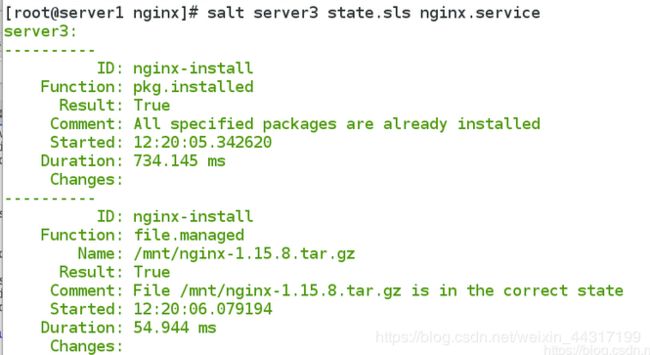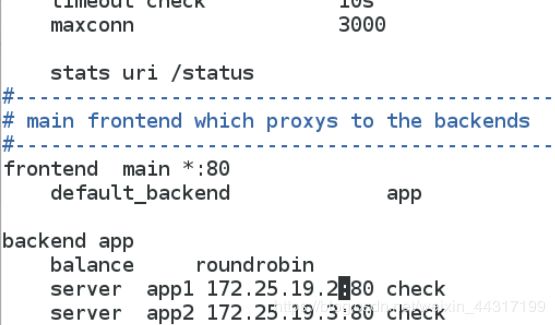SaltStack一键自动化部署高可用负载均衡集群
实验环境:
server1和server4组成高可用和负载均衡集群;
server2作为后端真实服务器提供httpd服务
server3作为后端真实服务器提供nginx服务
| 主机 | IP | 服务 | 角色 |
|---|---|---|---|
| server1 | 172.25.19.1 | haproxy,keepalived | master |
| server2 | 172.25.19.2 | httpd | minion |
| server3 | 172.25.19.3 | nginx | minion |
| server4 | 172.25.19.4 | haproxy,keepalived | minion |
server1/2/3/4都要指定master
[root@server1 ~]# cd /etc/salt/
[root@server1 salt]# vim minion
master: 172.25.19.1
开启服务
[root@server1 salt]# systemctl start salt-master
[root@server1 salt]# systemctl start salt-minion
[root@server2 salt]# systemctl start salt-minion
[root@server3 salt]# systemctl start salt-minion
[root@server4 salt]# systemctl start salt-minion
交换公钥
[root@server1 salt]# salt-key -L
[root@server1 salt]# salt-key -A # 添加显示的所有主机
[root@server1 salt]# salt-key -L
一、saltstack搭建httpd服务
[root@server1 minions]# cd /etc/salt/
[root@server1 salt]# vim master
674 file_roots:
675 base:
676 - /srv/salt ##这个目录没有,需要自己创建
[root@server1 salt]# mkdir /srv/salt
[root@server1 salt]# mkdir httpd
[root@server1 salt]# cd httpd/
[root@server1 httpd]# mkdir files
[root@server1 httpd]# cd files/
[root@server1 files]# pwd
/etc/salt/httpd/files
[root@server1 files]# ls
httpd.conf ##主机copy一个过来
[root@server1 files]# cd ..
[root@server1 httpd]# ls
files install.sls service.sls
[root@server1 httpd]# cat install.sls ##安装httpd
apache-install:
pkg.installed:
- pkgs:
- httpd
[root@server1 httpd]# cat service.sls ##启动httpd
include:
- httpd.install
/etc/httpd/conf/httpd.conf:
file.managed:
- source: salt://httpd/files/httpd.conf
httpd-service:
service.running:
- name: httpd
- enable: False
- reload: True
watch:
- file: /etc/httpd/conf/httpd.conf
[root@server1 httpd]# salt server3 state.sls nginx.service
二、saltstack搭建nginx
1.编辑自动编译安装nginx文件
[root@server1 salt]# mkdir nginx
[root@server1 salt]# cd nginx/
[root@server1 nginx]# mkdir files
[root@server1 nginx]# cd files/
[root@server1 files]# ls
nginx-1.15.8.tar.gz
[root@server1 nginx]# pwd
/srv/salt/nginx
[root@server1 nginx]# cat install.sls
nginx-install:
pkg.installed:
- pkgs:
- pcre-devel
- zlib-devel
- gcc
- make
file.managed:
- name: /mnt/nginx-1.15.8.tar.gz
- source: salt://nginx/files/nginx-1.15.8.tar.gz
cmd.run:
- name: cd /mnt && tar zxf nginx-1.15.8.tar.gz && cd nginx-1.15.8 && sed -i 's/CFLAGS="$CFLAGS -g"/#CFLAGS="$CFLAGS -g"/g' auto/cc/gcc && ./configure --prefix=/usr/local/nginx &> /dev/null && make &> /dev/null && make install &> /dev/null && cd .. && rm -fr nginx-1.15.8
- creates: /usr/local/nginx
[root@server1 nginx]# salt server3 state.sls nginx.install
2.
开启nginx服务脚本
[root@server1 nginx]# cat service.sls
include:
- nginx.install
- users.nginx
/usr/local/nginx/conf/nginx.conf:
file.managed:
- source: salt://nginx/files/nginx.conf
nginx-service:
file.managed:
- name: /etc/systemd/system/nginx.service
- source: salt://nginx/files/nginx.service
service.running:
- name: nginx
- reload: True
- watch:
- file: /usr/local/nginx/conf/nginx.conf
##编写nginx的启动脚本
[root@server1 nginx]# cd files/
[root@server1 files]# vim nginx.service
[Unit]
Description=The NGINX HTTP and reverse proxy server
After=syslog.target network.target remote-fs.target nss-lookup.target
[Service]
Type=forking
PIDFile=/usr/local/nginx/logs/nginx.pid
ExecStartPre=/usr/local/nginx/sbin/nginx -t
ExecStart=/usr/local/nginx/sbin/nginx
ExecReload=/usr/local/nginx/sbin/nginx -s reload
ExecStop=/usr/bin/kill -s QUIT $MAINPID
PrivateTmp=true
[Install]
WantedBy=multi-user.target
[root@server3 salt]# scp /usr/local/nginx/conf/nginx.conf server1:/srv/salt/nginx/files
[root@server1 nginx]# cd files/
[root@server1 files]# ls
nginx-1.15.8.tar.gz nginx.conf nginx.service
[root@server1 files]# vim nginx.conf
user nginx;
worker_processes auto;
#编辑自动建立nginx用户的sls文件
[root@server1 salt]# pwd
/srv/salt
[root@server1 salt]# mkdir users
[root@server1 salt]# cd users/
[root@server1 users]# vim nginx.sls
[root@server1 users]# cat nginx.sls
nginx:
user.present:
- uid: 1000
- shell: /sbin/nologin
[root@server1 nginx]# salt server3 state.sls nginx.service
更高级的推送方式
[root@server1 salt]# pwd
/srv/salt
[root@server1 salt]# vim top.sls
[root@server1 salt]# cat top.sls
base:
'server2':
- httpd.service ##server2安装httpd
'server3':
- nginx.service ##server3安装nginx
[root@server1 salt]# salt '*' state.highstate
三、用haproxy实现负载均衡
1.编辑install.sls文件,添加重新加载服务等
[root@server1 salt]# mkdir haproxy
[root@server1 salt]# cd haproxy/
[root@server1 haproxy]# vim install.sls
[root@server1 haproxy]# cat install.sls
haproxy-install:
pkg.installed:
- pkgs:
- haproxy
file.managed:
- name: /etc/haproxy/haproxy.cfg
- source: salt://haproxy/files/haproxy.cfg
service.running:
- name: haproxy
- reload: True
- watch:
- file: haproxy-install
2.将haproxy配置文件发送到server1salt目录下,编辑haproxy的配置文件
[root@server1 haproxy]# cd files/
[root@server1 files]# pwd
/srv/salt/haproxy/files
[root@server1 files]# ls
haproxy.cfg
[root@server1 files]# vim haproxy.cfg
stats uri /status
#---------------------------------------------------------------------
# main frontend which proxys to the backends
#---------------------------------------------------------------------
frontend main *:80
default_backend app
backend app
balance roundrobin
server app1 172.25.19.2:80 check
server app2 172.25.19.3:80 check
3.编辑两个后端的默认发布文件内容
[root@server2 salt]# cat /var/www/html/index.html
server2
[root@server3 salt]# cat /usr/local/nginx/html/index.html
server3
4.在base(/etc/salt)目录下,编辑top.sls,并推送
[root@server1 salt]# pwd
/srv/salt
[root@server1 salt]# vim top.sls
base:
'server1':
- haproxy.install
'server4':
- haproxy.install
'server2':
- httpd.service
'server3':
- nginx.service
[root@server1 salt]# salt '*' state.highstate
四、配置高可用
1.在server1的/srv/salt目录下,建立keepalived目录,进到目录里边编辑安装keepalived的sls推送文件
[root@server1 salt]# ls
_grains haproxy httpd nginx top.sls users
[root@server1 salt]# mkdir keepalived
[root@server1 salt]# cd keepalived/
[root@server1 keepalived]# mkdir files
[root@server1 keepalived]# vim install.sls
[root@server1 keepalived]# cat install.sls
kp-install:
pkg.installed:
- pkgs:
- keepalived
file.managed:
- name: /etc/keepalived/keepalived.conf
- source: salt://keepalived/files/keepalived.conf
- template: jinja
{% if grains['fqdn'] == 'server1' %} # server1是master
STATE: MASTER
VRID: 51
PRIORITY: 100
{% elif grains['fqdn'] == 'server4' %} # server2是backup
STATE: BACKUP
VRID: 51
PRIORITY: 50
{% endif %}
service.running:
- name: keepalived
- reload: True
- watch:
- file: kp-install
2.编辑 keepalived的脚本,配置文件远程发送到到sevrer1中/srv/salt/keepalived/files
[root@server4 keepalived]# scp keepalived.conf server1:/srv/salt/keepalived/files
[root@server1 files]# cat keepalived.conf
! Configuration File for keepalived
global_defs {
notification_email {
root@localhost
}
notification_email_from keepalived@localhost
smtp_server 127.0.0.1
smtp_connect_timeout 30
router_id LVS_DEVEL
}
vrrp_instance VI_1 {
state {{ STATE }}
interface eth0
virtual_router_id {{ VRID }}
priority {{ PRIORITY }}
advert_int 1
authentication {
auth_type PASS
auth_pass 1111
}
virtual_ipaddress {
172.25.19.100
}
}
3.安装mailx,用于接受推送消息
[root@server4 keepalived]# yum install -y mailx
[root@server1 keepalived]# yum install -y mailx
4.在/srv/salt下编辑全部节点的推送的top.sls文件
[root@server1 salt]# cat top.sls
base:
'server1':
- haproxy.install
- keepalived.install
'server4':
- haproxy.install
- keepalived.install
'server2':
- httpd.service
'server3':
- nginx.service
#执行top.sls文件,向所有节点安装以及部署服务
[root@server1 salt]# salt '*' state.highstate
5.查看vip已经在server1上了
[root@server1 files]# ip addr
测试通过vip可以实现后端的负载均衡
6.当server1关掉keepalived后,vip会自动飘逸到server4上
[root@server1 salt]# systemctl stop keepalived
[root@server4 keepalived]# ip addr










